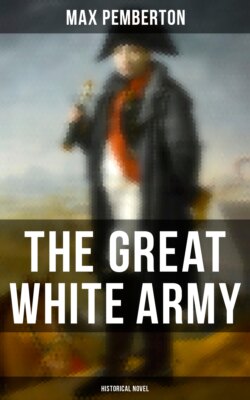Читать книгу The Great White Army (Historical Novel) - Pemberton Max - Страница 19
На сайте Литреса книга снята с продажи.
VI
ОглавлениеI have told you that there had been a glimmer of light shining from a loop-hole in the tower when first we drove up to the place. It was beneath this we came to a halt and stood to reckon with the situation. Bardot's eyes were quick as an animal's, and it was he who perceived a second opening in the wall, but not so high as the other, and without a light beyond to disclose it. When he suggested that he should climb up on my shoulders and get a footing at this spot, I could but ask him what he hoped to effect thereby.
"Had you a rope," said I, "perchance we could look through the window, but since you have not a rope——"
He interrupted me with a little cry. "Major," says he, "there was a rope in the boat."
I retorted that we had used it to make the ship fast, but he laughed at that.
"We shall return by the drawbridge," says he. "Do you stand sentinel here, and I will get what we want." And with that he was off like a shot, and for some minutes I saw him no more.
The interval was spent in listening to a sound of distant music, which I could not hear very plainly. There were women's voices and the music of fiddles, and it seemed to me that I had heard some of their songs in the casinos of my own Paris. Such a surprise was very welcome and put heart into me. Léon could hardly be in peril while women were singing to him. I told Bardot as much when he returned, and his curiosity concerning the voices was not less than my own.
"Let us have a look at them," says he. And with that he climbed upon my shoulders, and throwing the rope he had brought from the boat deftly about the iron bar of the window he pulled himself up like a monkey, and so gained a foothold on the ledge.
For a long time now he did not utter a word. I thought that I heard him laughing softly, and then, of a sudden, he appeared to grow deeply interested in what was happening in the room.
"What do you see, Bardot?" I asked him, anxiety getting the better of me.
He did not reply, but peered the closer betwixt the bars.
"Oh!" cried I impatiently, "there will be some woman for a certainty."
His answer was to take a pistol from his belt and to look to the priming. I could see him quite clearly, one arm being about the iron bar and the other upon the trigger, which he had cocked.
"Good God!" I cried. "You will bring them out on us."
He did not heed me, but throwing his head back, he said in a loud whisper: "They are going to butcher your nephew." At the same moment I heard a dreadful scream from the tower itself.
"Help me up!" cried I, gone mad at my own impotence. "Why do you not fire at them?"
He nodded his head, and thrusting his pistol through the bars, he snapped at an unseen enemy. The weapon did not fire, and he threw it down to me angrily. "Your own," he cried, and came a little way down the rope to reach it.
The next minute there was a loud report, and upon that a hollow sound, as though a great bell had been struck a heavy blow by a hammer.
"Now," cried Bardot quickly, "to the bridge!"
I did not question him, and we ran round together to fling down the bridge, the windlass running out with the sound of a great ship's cable. It seemed inconceivable that the Russians in the place did not attack us. This, however, did not happen.
We ran across the bridge and there crouched as two hunters who themselves were hunted.
"Listen!" says Bardot, bending his ear to the earth.
I imitated him, and heard a strange sound. It was the thunder of cavalry through the wood.
"The Cossacks!" cried I. It seemed to me then that I should never see poor Léon again.
